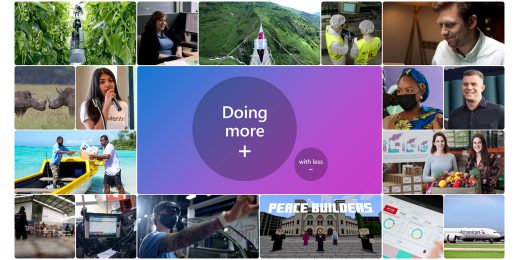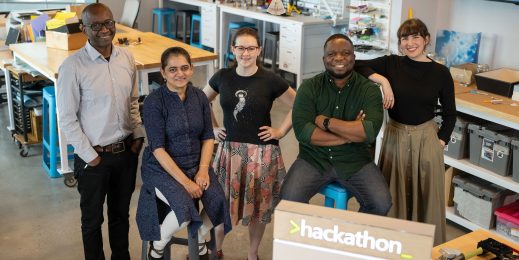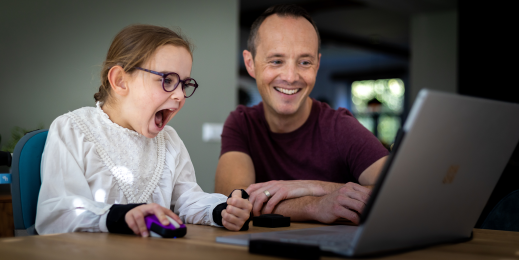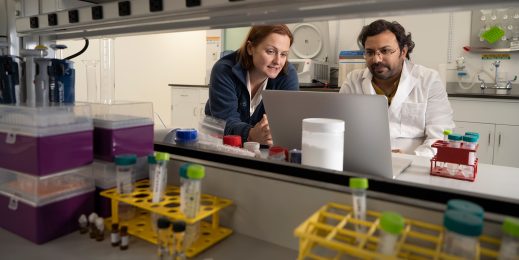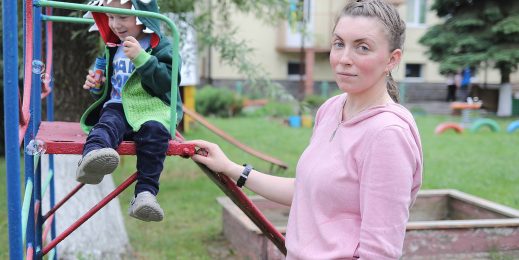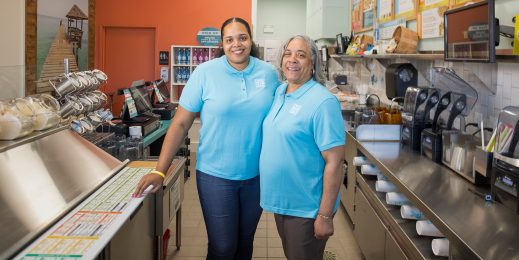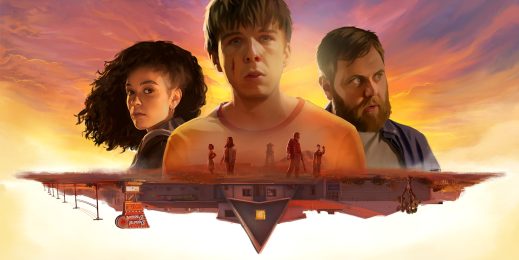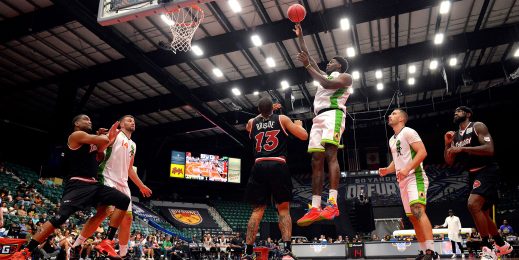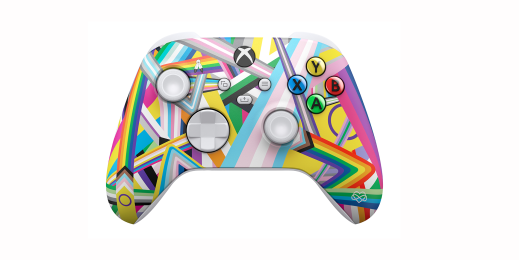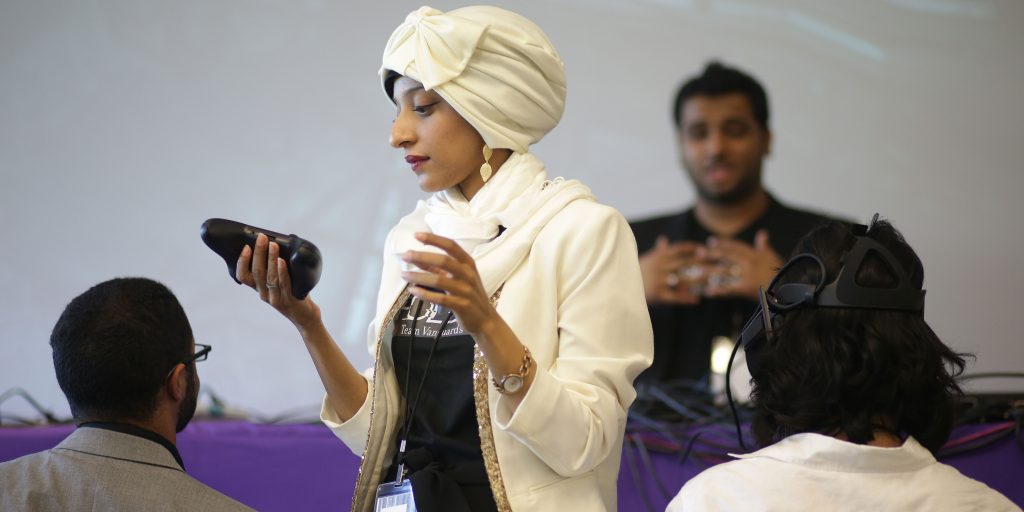
A tension-packed game, an app to treat stuttering and more take center stage at Imagine Cup World Finals
The two Imagine Cup judges are working together, one wearing a virtual reality headset and the other using a PC, to navigate the corridors of a seemingly deserted spaceship that has crashed somewhere near Mars. He has a map; she doesn’t. He also must help her figure out how to get past locked doors.
But there’s a reason the students who created “Apollo X” call it a horror game. The player who’s lost in the murky darkness of the spaceship is being hunted by a ghost. A Microsoft Band is tracking her heart rate to assess how calm she is. If she gets stressed, the game gets harder. And scarier.
The ghost appears. A few people in the audience startle. Mahmood AlSarhani, who created the game with fellow student Noof Abdulla, offers a bit of guidance: “If he saw you, it’s too late,” he tells the judge. “Run!”
The lively game demo was part of Wednesday’s World Finals in the Imagine Cup, Microsoft’s marquee global student technology competition. The two students from Bahrain, who make up the Vanguards team, and 34 other teams from around the globe came to soak up guidance from technology experts and showcase their creativity and hard work in vying for more than $200,000 in cash and prizes.
The top winner will receive a private mentoring session with CEO Satya Nadella and the coveted title of Imagine Cup World Champion.
People around the globe can watch the Imagine Cup awards ceremony at 9:30 a.m. PT Thursday to see who wins in this year’s Games, Innovation and World Citizenship categories. At 9 a.m. PT Friday, the three first-place winners will face off before a stellar panel of judges in a dramatic final round that will be streamed live.
On Wednesday morning, students clustered around laptops and snacks in a designated study lounge, making last-minute preparations for their presentations to the three categories’ judges panels at Microsoft headquarters in Redmond, Washington. Some rehearsed impassioned speeches about their projects in hallways filled with nervousness and excitement.
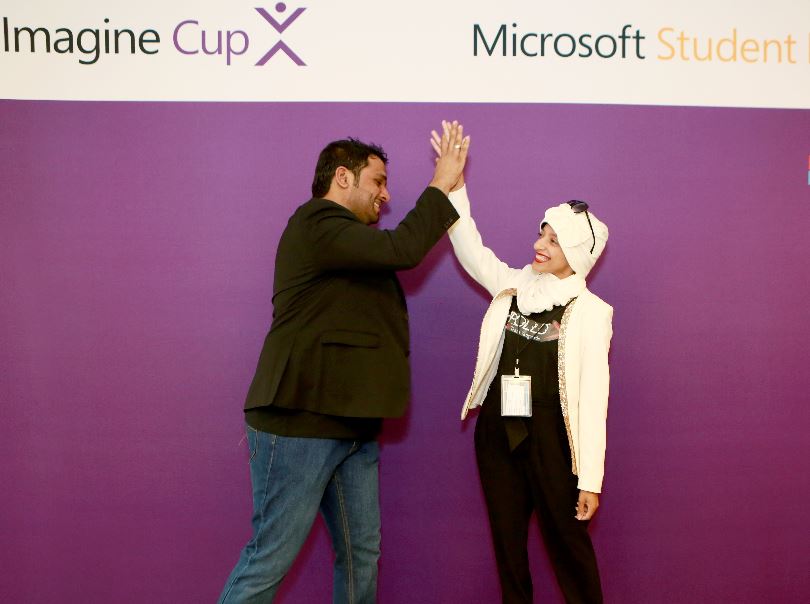
The Vanguards team’s game was inspired, in part, by a friend who was diagnosed with anxiety and has frequent panic attacks and uncontrollable stress. The team wanted to find a way to help. “Apollo X” is aimed at helping people who suffer from such problems by making them become more aware of their feelings and reinforcing their efforts to keep those feelings in check.
“This is not just a game for entertainment,” Abdulla tells the judges. “This can also be a tool for anxiety, stress and PTSD, due the fact that the game encourages you to stay calm.”
When the player’s heartrate goes up, the view inside the spaceship becomes dimmer, making the game more chilling and all the more challenging. The player starts to hear the main character’s breathing. If their own heartrate doesn’t settle soon, they’ll hear the distressing sound of the character’s panicked heartbeat, too. The music also takes an unsettling turn.
“Is there actually a way out of here?” asks the judge wearing the virtual reality headset. She moves her head, trying to find her way through the spaceship’s labyrinth interior. “I have no idea where I am.”
She finds a door and manages to open it, but the ghost is waiting. “He caught you. Run!” AlSarhani advises again, as the audience watches intently. A few people chuckle quietly, seeing what has happened. “Ah,” AlSarhani informs her. “You died.”
Noof says the game is poised to take advantage of a virtual reality market that is “exploding as we speak.” They created it for Windows 10 but hope to develop it for Xbox and HoloLens, and they are exploring how it can be used in the health care sector to help treat stress disorders.
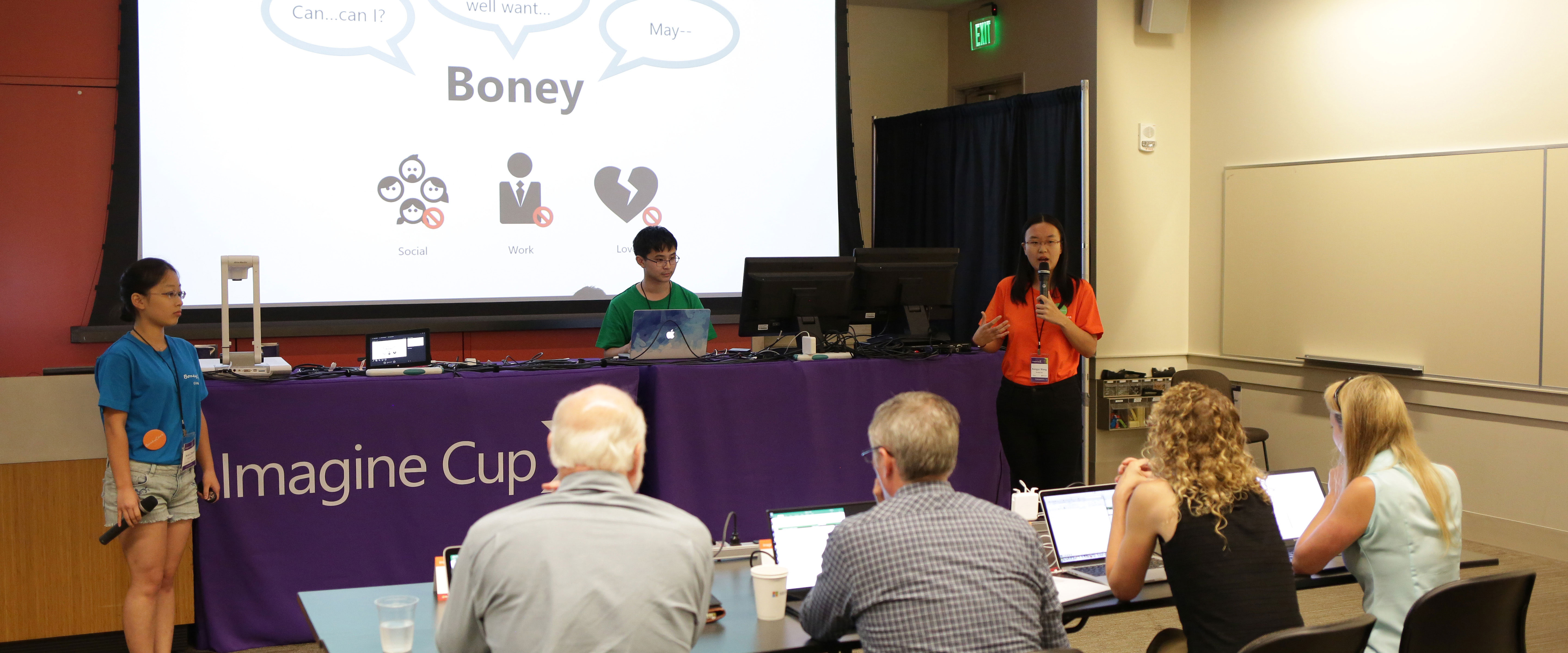
The BoneyCare team of China has developed an app to help people who stutter.
One of the first teams to present their project Wednesday morning was the BoneyCare team from China. The three second-year computer science students created a cloud-based app aimed at diagnosing and treating people who stutter.
Team member Rongyu Wang has a friend who has always struggled with stuttering, and she has “witnessed a lot of frustration about how he was treated,” she tells the judges. “He was teased, and he was bullied by others.”
She and teammates Chenggang Li and Yuzhu Zhang say the BoneyCare app — a finalist in the World Citizenship category — saves, analyzes and studies users’ voice patterns, as well as their emotions and other profile data, to provide customized treatment advice.
It keeps track of users’ training and progress, and offers Delayed Audio Feedback, which delays users’ hearing of their own voice by a fraction of a second. The technique has been shown to reduce stuttering considerably in some people.
Zhang says they believe it’s the first-ever app to address stuttering. They designed it to be an easier, more affordable and less time-consuming treatment strategy than traditional speech therapy. He says it also makes diagnosis less subjective and more scientific than a doctor’s approach might be.
“By applying our data, we can automatically know what level our patients are at,” Zhang says. “Everything is quantified on our server.”
At the judges’ request, Zhang demonstrated the app, which required him to read a paragraph aloud. The app then evaluated his speech patterns and returned results within seconds, tallying three instances of interrupted speech, two word repetitions and four interjections.
The team hopes to work with medical institutions to acquire more patient data, further refine their algorithms and eventually make BoneyCare available for use in health care facilities.
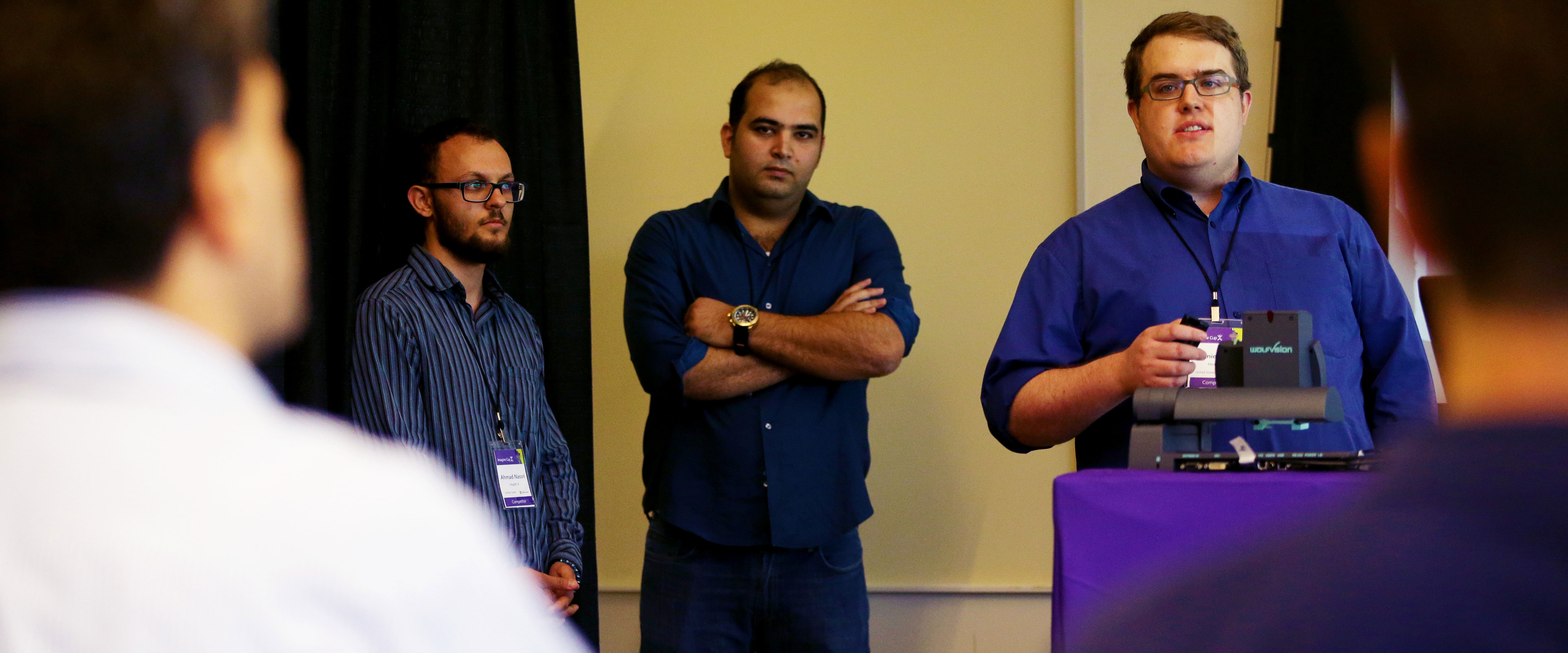
Members of the HealthX team present their game to the panel of judges for the Innovation category.
For the teams, presenting their projects to the Imagine Cup judges offers an opportunity to learn. Ahmad Alsaleem, a member of the HealthX team from the U.S., says “the judge’s feedback was really amazing” and offered “ideas of how to do things in the future.”
Alsaleem, along with Daniel Blair and Ahmad Nassri, created “HealthX” to help combat a surprisingly common affliction that often goes undiagnosed in young children: Amblyopia, or “lazy eye.” Their game aims to diagnose and treat the condition through a game that’s played using only your eyes.
In their demonstration for the judges, the player is a cowboy wandering the Wild West in search of treasure chests as menacing birds swoop in from all sides. Instead of using a controller, players navigate by looking at arrows on the screen. They must fend off the menacing birds by shooting them, something they also must do with their eyes.
An infrared eye tracker mounted underneath the computer monitor tracks eye movement individually, eliminating the need to cover one, and can detect improvements as the game is used for treatment.
Alsaleem tells the judges it’s “a way to diagnose lazy eye in a novel way that has not been done before.”
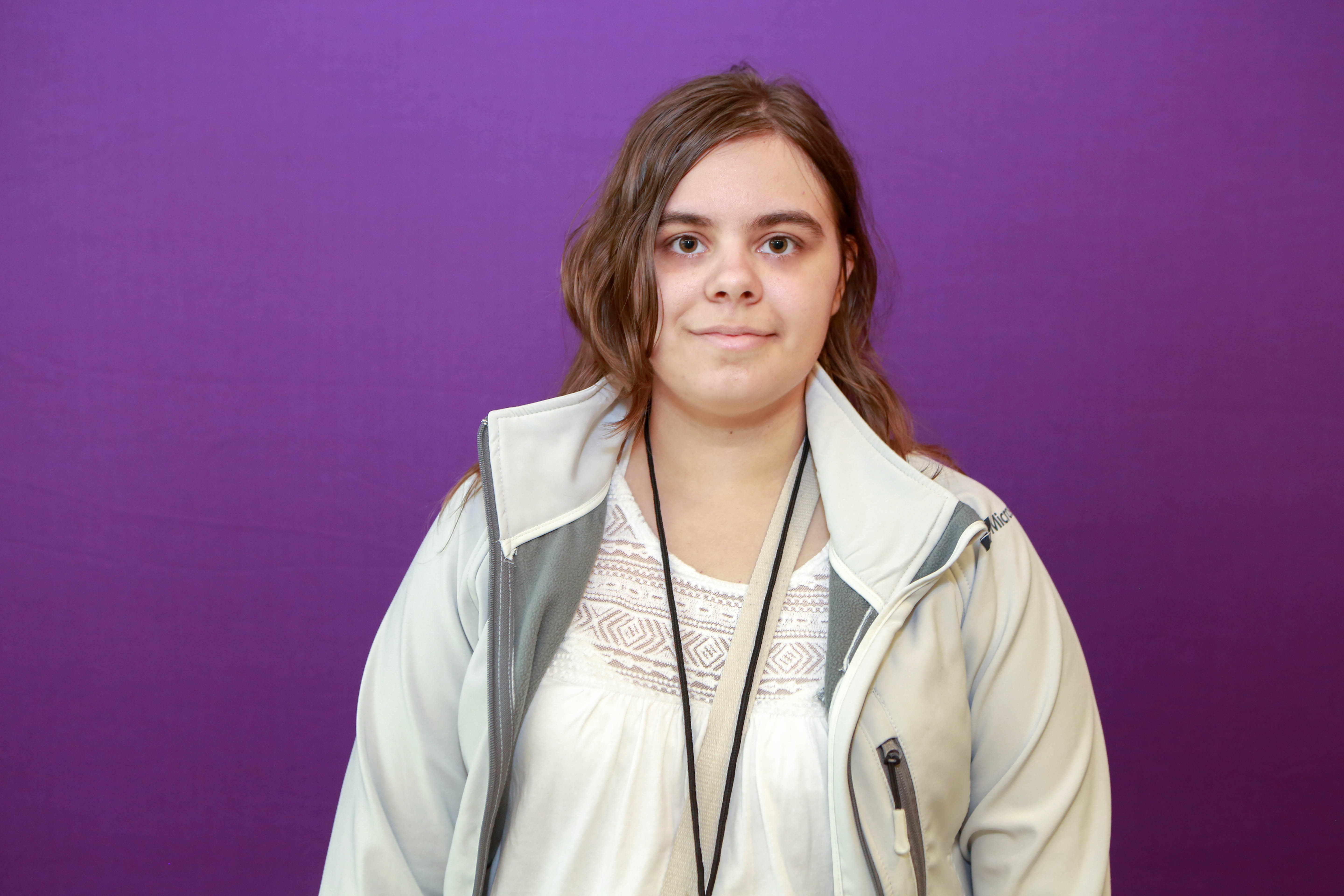
The three team members, who were up until the wee hours of the morning working on their presentation, smiled broadly and breathed sighs of relief when they completed their presentation.
Other students are still preparing for their competition.
Silvia Barbero Rodríguez of Spain created her Shooting Star Studios entry in the Games competition, “The Void,” by herself, tackling the art, coding music and storyline. She says she was up late practicing, “but not too much, because I’m nervous if I practice too much.”
Members of Axe Julius, a team from India that has created an app to distribute eBooks in an innovative way, is hunkered around their computers making sure everything they need for their presentation is ready to go. They are excited to be finalists in this year’s Imagine Cup.
“We feel this is a very good opportunity to showcase our work for a cause we really believe in,” says team member Akshay Kumar Gupta. “It’s very inspiring to see what other students are doing here. Everyone has such a great idea.”
Lead photo: Noof Abdulla, foreground, and fellow Vanguards team member Mahmood AlSarhani demonstrate their game, “Apollo X,” for the judges.





